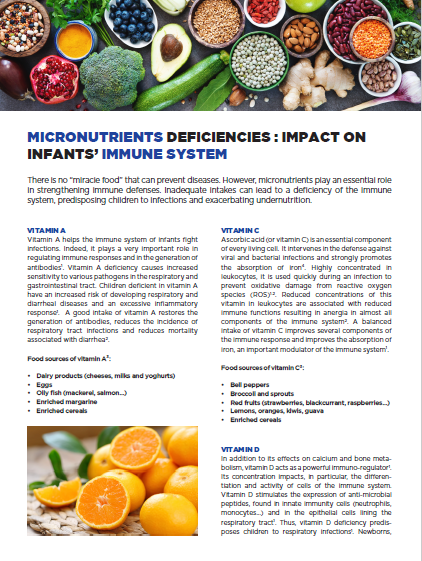There is no “miracle food” that can prevent diseases. However, micronutrients play an essential role in strengthening immune defenses. Inadequate intakes can lead to a deficiency of the immune system, predisposing children to infections and exacerbating undernutrition.
Vitamin A
Vitamin A helps the immune system of infants fight infections. Indeed, it plays a very important role in regulating immune responses and in the generation of antibodies1. Vitamin A deficiency causes increased sensitivity to various pathogens in the respiratory and gastrointestinal tract. Children deficient in vitamin A have an increased risk of developing respiratory and diarrheal diseases and an excessive inflammatory response1. A good intake of vitamin A restores the generation of antibodies, reduces the incidence of respiratory tract infections and reduces mortality associated with diarrhea2.
Food sources of vitamin A3:
- Dairy products (cheeses, milks and yoghurts)
- Eggs
- Oily fish (mackerel, salmon…)
- Enriched margarine
- Enriched cereals
Vitamin C
Ascorbic acid (or vitamin C) is an essential component of every living cell. It intervenes in the defense against viral and bacterial infections and strongly promotes the absorption of iron4. Highly concentrated in leukocytes, it is used quickly during an infection to prevent oxidative damage from reactive oxygen species (ROS)1.2. Reduced concentrations of this vitamin in leukocytes are associated with reduced immune functions resulting in anergia in almost all components of the immune system2. A balanced intake of vitamin C improves several components of the immune response and improves the absorption of iron, an important modulator of the immune system1.
Food sources of vitamin C3:
- Bell peppers
- Broccoli and sprouts
- Red fruits (strawberries, blackcurrant, raspberries…)
- Lemons, oranges, kiwis, guava
- Enriched cereals
Vitamin D
In addition to its effects on calcium and bone metabolism, vitamin D acts as a powerful immuno-regulator1. Its concentration impacts, in particular, the differentiation and activity of cells of the immune system. Vitamin D stimulates the expression of anti-microbial peptides, found in innate immunity cells (neutrophils, monocytes…) and in the epithelial cells lining the respiratory tract1. Thus, vitamin D deficiency predisposes children to respiratory infections1. Newborns, infants and pregnant women are most at risk of vitamin D deficiency5. Sun exposure is the most natural way to get enough vitamin D (15 minutes per day) but the intakes may also be increased through diet or supplements5.
Food sources of vitamin D3:
- Oily fish (salmon, sardines, mackerel…)
- Eggs
- Enriched margarine
- Enriched cereals
Iron
Iron occurs at all levels of the immune system modulation. It is essential for oxygen transport as well as for cell growth and differentiation, including that ofT lymphocytes1,2. It also plays an important role in regulating cytokines production and in the process of bacteria destruction by neutrophils1. Thus, iron deficiency affects the ability to have an adequate immune response (maturation, differentiation and proliferation of immune cells)6. A balanced intake of well-absorbed iron and coupled with vitamin C helps prevent iron deficiency.
Food sources of iron3.7:
- Meat (especially red meat)
- Fish
- Fortified infants formulas and growing-up milks
- Enriched cereals
Zinc
Zinc is a dietary trace element that, beyond its essential functions in growth and development, plays an crucial role for high-proliferation immune cells and influences innate and adaptative immune functions1. Zinc deficiency hinders hostdefense process, increasing the child’s susceptibility to various pathogens2. Thus, ensuring adequate zinc intakes is essential for optimal immune function and protection against infectious pathogens2.
Food sources of zinc3:
- Cereals products, such as wheat germ
- Meat
- Seafood
- Dairy products (milk, cheese)
- Bread

Publication : Micronutrients deficiencies – impact on infants’ immune system
References
- Maggini, Silvia, et al. “Selected vitamins and trace elements support immune function by strengthening epithelial barriers and cellular and humorous immune responses.” British Journal of Nutrition S1 (2007): S29-S35.
- Field, Catherine J., Ian R. Johnson, and Patricia D. Schley. “Nutrients and their role in host resistance to infection.” Journal of leukocyte biology 1 (2002): 16-32.
- CIQUAL ANSES – Food Nutritional Composition Table (https://ciqual.anses.fr/) vitamin A (retinol), vitamin C (ascorbic acid), vitamin D, iron and zinc
- https://www.anses.fr/fr/content/vitamine-c-ou-acide-ascorbique
- https://www.anses.fr/fr/content/vitamine-d
- Hassan, Tamer Hasan, et al. “Impact of iron deficiency anemia on the function of the immune system in children.” Medicine 47 (2016).
- Tounian, P., and J-P. Chouraqui. “Fer et nutrition.” Pediatric Archives 5 (2017):): 5S23-5S31.
BA20-368
